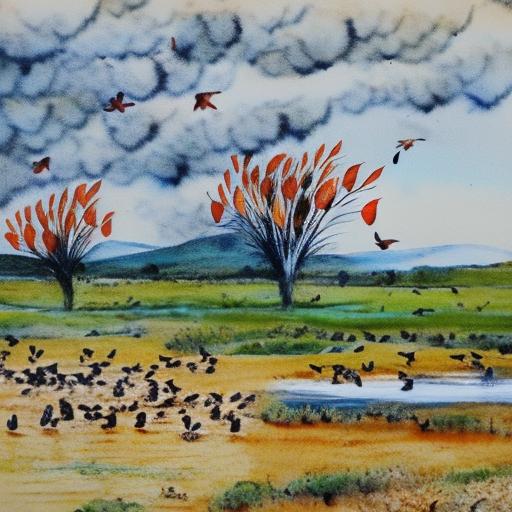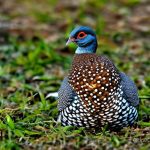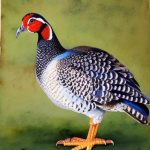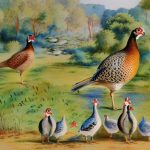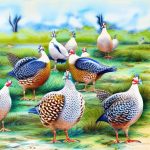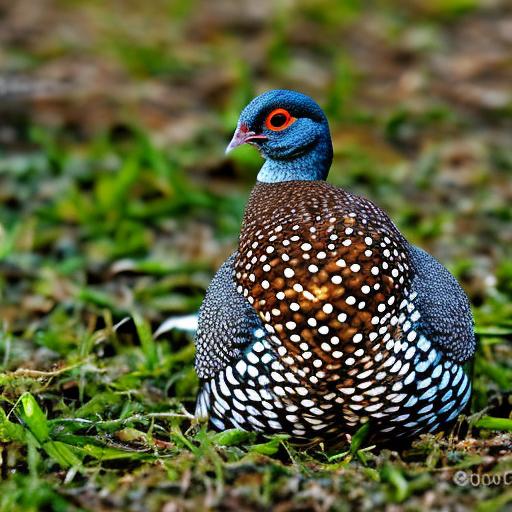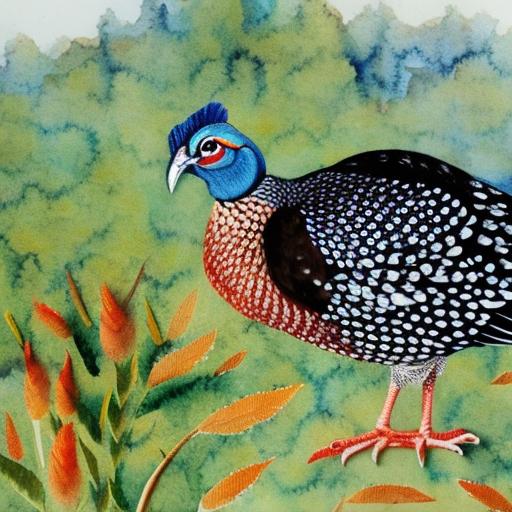Guinea fowl breeding season in South Africa is an important time for farmers and conservationists alike. This period, which typically occurs in the spring and summer months, is when guinea fowl engage in courtship, mating, and nesting activities. It is a critical time for the survival and growth of guinea fowl populations, as it is when new generations of birds are produced. Understanding the breeding season of guinea fowl is essential for those who wish to breed these birds successfully, whether for agricultural purposes or for conservation efforts. In this article, we will explore the breeding behavior of guinea fowl, the factors that affect their breeding season in South Africa, the importance of guinea fowl breeding for conservation and agriculture, as well as tips for successful breeding and the challenges and threats that guinea fowl face during the breeding season.
Key Takeaways
- Guinea fowl breeding season typically occurs in the spring and summer months in South Africa.
- Guinea fowl exhibit unique breeding behaviors such as forming monogamous pairs and building ground nests.
- Factors affecting guinea fowl breeding season in South Africa include climate, food availability, and predator presence.
- Guinea fowl breeding is important for conservation efforts and for controlling pests in agriculture.
- Successful guinea fowl breeding in South Africa requires providing suitable nesting sites and protecting against predators.
Understanding the Breeding Behavior of Guinea Fowl
During the breeding season, male guinea fowl engage in elaborate courtship displays to attract females. These displays often involve puffing up their feathers, strutting, and making loud calls to impress potential mates. Once a male has successfully courted a female, they will engage in mating behavior, which typically occurs in secluded areas away from predators. After mating, the female will begin to search for a suitable nesting site, often on the ground in hidden locations such as tall grass or shrubs. Guinea fowl are known for their secretive nesting behavior, and females will go to great lengths to conceal their nests from predators. Once the eggs are laid, the female will diligently incubate them for about 26-28 days before they hatch. Understanding these behaviors is crucial for those looking to breed guinea fowl, as it allows them to create suitable conditions for successful mating and nesting.
During the breeding season, male guinea fowl engage in elaborate courtship displays to attract females. These displays often involve puffing up their feathers, strutting, and making loud calls to impress potential mates. Once a male has successfully courted a female, they will engage in mating behavior, which typically occurs in secluded areas away from predators. After mating, the female will begin to search for a suitable nesting site, often on the ground in hidden locations such as tall grass or shrubs. Guinea fowl are known for their secretive nesting behavior, and females will go to great lengths to conceal their nests from predators. Once the eggs are laid, the female will diligently incubate them for about 26-28 days before they hatch. Understanding these behaviors is crucial for those looking to breed guinea fowl, as it allows them to create suitable conditions for successful mating and nesting.
Factors Affecting Guinea Fowl Breeding Season in South Africa
Several factors can affect the breeding season of guinea fowl in South Africa. One of the most significant factors is environmental conditions, such as rainfall and temperature. Guinea fowl are sensitive to changes in weather patterns, and a lack of rainfall or extreme temperatures can impact their breeding success. Additionally, habitat loss and fragmentation can also affect guinea fowl breeding season, as it can disrupt their nesting sites and expose them to predators. Predation is another significant factor that can impact guinea fowl breeding success. Nest predation by animals such as snakes, mongooses, and birds of prey can significantly reduce the number of eggs that successfully hatch. Finally, human activities such as hunting and habitat destruction can also have a negative impact on guinea fowl breeding season in South Africa.
Several factors can affect the breeding season of guinea fowl in South Africa. One of the most significant factors is environmental conditions, such as rainfall and temperature. Guinea fowl are sensitive to changes in weather patterns, and a lack of rainfall or extreme temperatures can impact their breeding success. Additionally, habitat loss and fragmentation can also affect guinea fowl breeding season, as it can disrupt their nesting sites and expose them to predators. Predation is another significant factor that can impact guinea fowl breeding success. Nest predation by animals such as snakes, mongooses, and birds of prey can significantly reduce the number of eggs that successfully hatch. Finally, human activities such as hunting and habitat destruction can also have a negative impact on guinea fowl breeding season in South Africa.
The Importance of Guinea Fowl Breeding for Conservation and Agriculture
Guinea fowl breeding is essential for both conservation efforts and agricultural purposes in South Africa. In terms of conservation, breeding guinea fowl helps to maintain healthy populations of these birds in their natural habitats. As many species of guinea fowl are facing threats such as habitat loss and hunting pressure, breeding programs can help to bolster their numbers and ensure their survival for future generations. Additionally, guinea fowl play an important role in agricultural pest control. These birds are known for their voracious appetite for insects and ticks, making them valuable allies for farmers looking to control pests without resorting to chemical pesticides. By promoting guinea fowl breeding, farmers can harness the natural pest control abilities of these birds to protect their crops and livestock.
Guinea fowl breeding is essential for both conservation efforts and agricultural purposes in South Africa. In terms of conservation, breeding guinea fowl helps to maintain healthy populations of these birds in their natural habitats. As many species of guinea fowl are facing threats such as habitat loss and hunting pressure, breeding programs can help to bolster their numbers and ensure their survival for future generations. Additionally, guinea fowl play an important role in agricultural pest control. These birds are known for their voracious appetite for insects and ticks, making them valuable allies for farmers looking to control pests without resorting to chemical pesticides. By promoting guinea fowl breeding, farmers can harness the natural pest control abilities of these birds to protect their crops and livestock.
Tips for Successful Guinea Fowl Breeding in South Africa
For those looking to breed guinea fowl successfully in South Africa, there are several tips to keep in mind. First and foremost, providing suitable habitat is crucial for encouraging successful breeding. This includes offering areas with dense vegetation for nesting sites and access to water sources for drinking and bathing. Additionally, minimizing disturbances from predators and human activities can help to create a safe environment for guinea fowl to breed. Providing supplemental food sources during lean times can also support breeding success by ensuring that birds have access to adequate nutrition throughout the breeding season. Finally, monitoring populations and nesting sites can help to identify any potential threats or issues that may impact breeding success.
For those looking to breed guinea fowl successfully in South Africa, there are several tips to keep in mind. First and foremost, providing suitable habitat is crucial for encouraging successful breeding. This includes offering areas with dense vegetation for nesting sites and access to water sources for drinking and bathing. Additionally, minimizing disturbances from predators and human activities can help to create a safe environment for guinea fowl to breed. Providing supplemental food sources during lean times can also support breeding success by ensuring that birds have access to adequate nutrition throughout the breeding season. Finally, monitoring populations and nesting sites can help to identify any potential threats or issues that may impact breeding success.
Challenges and Threats to Guinea Fowl Breeding in South Africa

Despite the importance of guinea fowl breeding in South Africa, there are several challenges and threats that these birds face during the breeding season. Habitat loss and fragmentation due to agricultural expansion and urban development have reduced the availability of suitable nesting sites for guinea fowl. This has made them more vulnerable to predation and has led to declines in breeding success. Additionally, hunting pressure on guinea fowl populations has also had a negative impact on their ability to breed successfully. As these birds are often targeted for their meat and feathers, hunting can reduce population numbers and disrupt breeding behaviors. Climate change is another significant threat to guinea fowl breeding in South Africa, as it can lead to unpredictable weather patterns that impact nesting success.
Despite the importance of guinea fowl breeding in South Africa, there are several challenges and threats that these birds face during the breeding season. Habitat loss and fragmentation due to agricultural expansion and urban development have reduced the availability of suitable nesting sites for guinea fowl. This has made them more vulnerable to predation and has led to declines in breeding success. Additionally, hunting pressure on guinea fowl populations has also had a negative impact on their ability to breed successfully. As these birds are often targeted for their meat and feathers, hunting can reduce population numbers and disrupt breeding behaviors. Climate change is another significant threat to guinea fowl breeding in South Africa, as it can lead to unpredictable weather patterns that impact nesting success.
The Future of Guinea Fowl Breeding in South Africa
The future of guinea fowl breeding in South Africa depends on our ability to address the challenges and threats that these birds face during the breeding season. Conservation efforts aimed at protecting habitat, reducing hunting pressure, and mitigating the impacts of climate change are essential for ensuring the continued success of guinea fowl breeding programs. Additionally, promoting sustainable agricultural practices that support guinea fowl populations can help to ensure that these birds continue to play a valuable role in pest control on farms. By working together to address these challenges, we can secure a bright future for guinea fowl breeding in South Africa and ensure that these iconic birds continue to thrive in their natural habitats.
The future of guinea fowl breeding in South Africa depends on our ability to address the challenges and threats that these birds face during the breeding season. Conservation efforts aimed at protecting habitat, reducing hunting pressure, and mitigating the impacts of climate change are essential for ensuring the continued success of guinea fowl breeding programs. Additionally, promoting sustainable agricultural practices that support guinea fowl populations can help to ensure that these birds continue to play a valuable role in pest control on farms. By working together to address these challenges, we can secure a bright future for guinea fowl breeding in South Africa and ensure that these iconic birds continue to thrive in their natural habitats.
The future of guinea fowl breeding in South Africa depends on our ability to address the challenges and threats that these birds face during the breeding season. Conservation efforts aimed at protecting habitat, reducing hunting pressure, and mitigating the impacts of climate change are essential for ensuring the continued success of guinea fowl breeding programs. Additionally, promoting sustainable agricultural practices that support guinea fowl populations can help to ensure that these birds continue to play a valuable role in pest control on farms. By working together to address these challenges, we can secure a bright future for guinea fowl breeding in South Africa and ensure that these iconic birds continue to thrive in their natural habitats. It is important for all stakeholders, including government agencies, conservation organizations, farmers, and local communities, to collaborate and take action to protect the future of guinea fowl breeding in South Africa.
As the guinea fowl breeding season approaches in South Africa, it’s essential to ensure that your coop is ready to provide a safe and comfortable environment for your birds. To prepare for this, you may want to consider the best type of coop for your chickens. Poultry Wizard offers a helpful article on “What Kind of Coop is Best for Chickens” that provides valuable insights into choosing the right housing for your poultry. Additionally, as the weather can fluctuate during the breeding season, it’s important to insulate your chicken coop properly. Poultry Wizard also offers a comprehensive guide on “How to Insulate a Chicken Coop” to help you maintain an optimal temperature for your birds. Ensuring that your coop is secure and well-insulated can contribute to the success of your guinea fowl breeding season.
FAQs
What is the breeding season for guinea fowl in South Africa?
The breeding season for guinea fowl in South Africa typically occurs during the spring and summer months, from September to February.
How do guinea fowl breed in South Africa?
Guinea fowl in South Africa typically form monogamous pairs during the breeding season. The female will lay a clutch of eggs in a shallow depression on the ground, and both the male and female will take turns incubating the eggs.
How many eggs do guinea fowl lay during the breeding season?
Guinea fowl hens can lay anywhere from 20 to 30 eggs in a single breeding season, with each egg taking approximately 26-28 days to hatch.
What is the role of the male guinea fowl during the breeding season?
During the breeding season, the male guinea fowl plays a crucial role in protecting the nesting female and the eggs. He will also take turns incubating the eggs with the female.
What are the environmental conditions required for successful guinea fowl breeding in South Africa?
Guinea fowl breeding in South Africa requires a suitable habitat with access to water, open grasslands, and shrubby areas for nesting. Adequate food sources and protection from predators are also important for successful breeding.
Meet Walter, the feathered-friend fanatic of Florida! Nestled in the sunshine state, Walter struts through life with his feathered companions, clucking his way to happiness. With a coop that’s fancier than a five-star hotel, he’s the Don Juan of the chicken world. When he’s not teaching his hens to do the cha-cha, you’ll find him in a heated debate with his prized rooster, Sir Clucks-a-Lot. Walter’s poultry passion is no yolk; he’s the sunny-side-up guy you never knew you needed in your flock of friends!

